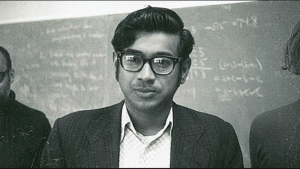Srinivasa Ramanujan: Difference between revisions
(Created page with "thumb|Srinivasa Ramanujan '''[https://en.wikipedia.org/wiki/Srinivasa_Ramanujan Srinivasa Ramanujan]''' (born 22 December 1887 – died 26 April 1920) born Srinivasa Ramanujan Aiyangar, was an Indian mathematician. Though he had almost no formal training in pure mathematics, he made substantial contributions to mathematical analysis, number theory, infinite series, and continued fractions, including solutions to mathematical problem...") |
The Admins (talk | contribs) No edit summary |
||
| Line 1: | Line 1: | ||
[[File:Srinivasa Ramanujan photo.png|thumb|Srinivasa Ramanujan]] | [[File:Srinivasa Ramanujan photo.png|thumb|Srinivasa Ramanujan]] | ||
'''[ | '''[[Wikipedia:Srinivasa_Ramanujan|Srinivasa Ramanujan]]''' (born 22 December 1887 – died 26 April 1920) born Srinivasa Ramanujan Aiyangar, was an Indian mathematician. Though he had almost no formal training in pure mathematics, he made substantial contributions to mathematical analysis, number theory, infinite series, and continued fractions, including solutions to mathematical problems then considered unsolvable. | ||
Ramanujan married a nine-year-old girl: | Ramanujan married a nine-year-old girl: | ||
| Line 7: | Line 7: | ||
<br><br>'''Bullough V.L.''' (1990). “History in adult human sexual behavior with children and adolescents in Western societies”, in ''[https://library.lol/main/3CA15750CD7EC06C3052B55B5E16C76D Pedophilia: Biosocial Dimensions]'' (Jay R. Feierman, ed.). New York: Springer-Verlag Publishers, p. 71.</blockquote> | <br><br>'''Bullough V.L.''' (1990). “History in adult human sexual behavior with children and adolescents in Western societies”, in ''[https://library.lol/main/3CA15750CD7EC06C3052B55B5E16C76D Pedophilia: Biosocial Dimensions]'' (Jay R. Feierman, ed.). New York: Springer-Verlag Publishers, p. 71.</blockquote> | ||
[[Category:Official Encyclopedia]][[Category:People]][[Category:People: Adult or Minor sexually attracted to or involved with the other]][[Category:History & Events]][[Category:People: Deceased]][[Category: People: Historical minor-attracted figures]][[Category:People: Academics]] | [[Category:Official Encyclopedia]][[Category:People]][[Category:People: Adult or Minor sexually attracted to or involved with the other]][[Category:History & Events: Indian]][[Category:People: Deceased]][[Category:People: Indian]][[Category: People: Historical minor-attracted figures]][[Category:People: Academics]] | ||
Revision as of 22:28, 11 February 2023

Srinivasa Ramanujan (born 22 December 1887 – died 26 April 1920) born Srinivasa Ramanujan Aiyangar, was an Indian mathematician. Though he had almost no formal training in pure mathematics, he made substantial contributions to mathematical analysis, number theory, infinite series, and continued fractions, including solutions to mathematical problems then considered unsolvable.
Ramanujan married a nine-year-old girl:
The third historical figure is the great Indian mathematical genius, Srinivasa Ramanujan, who was born in 1887 and died some 32 years later. At age 22, he married 9-year-old Srimathia Janki, who brought her mother with her when she moved into his household (Kolata, 1987).
Bullough V.L. (1990). “History in adult human sexual behavior with children and adolescents in Western societies”, in Pedophilia: Biosocial Dimensions (Jay R. Feierman, ed.). New York: Springer-Verlag Publishers, p. 71.